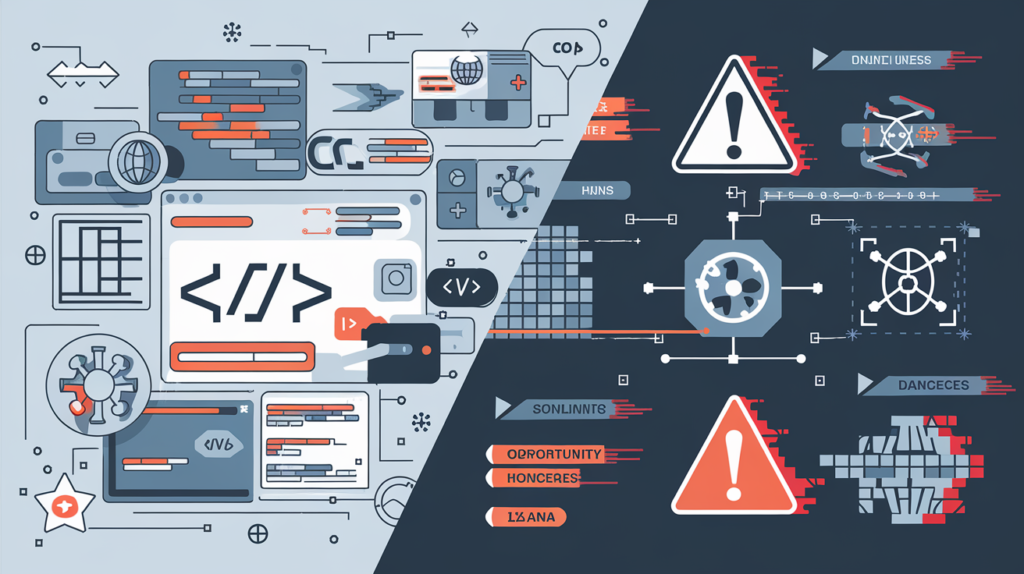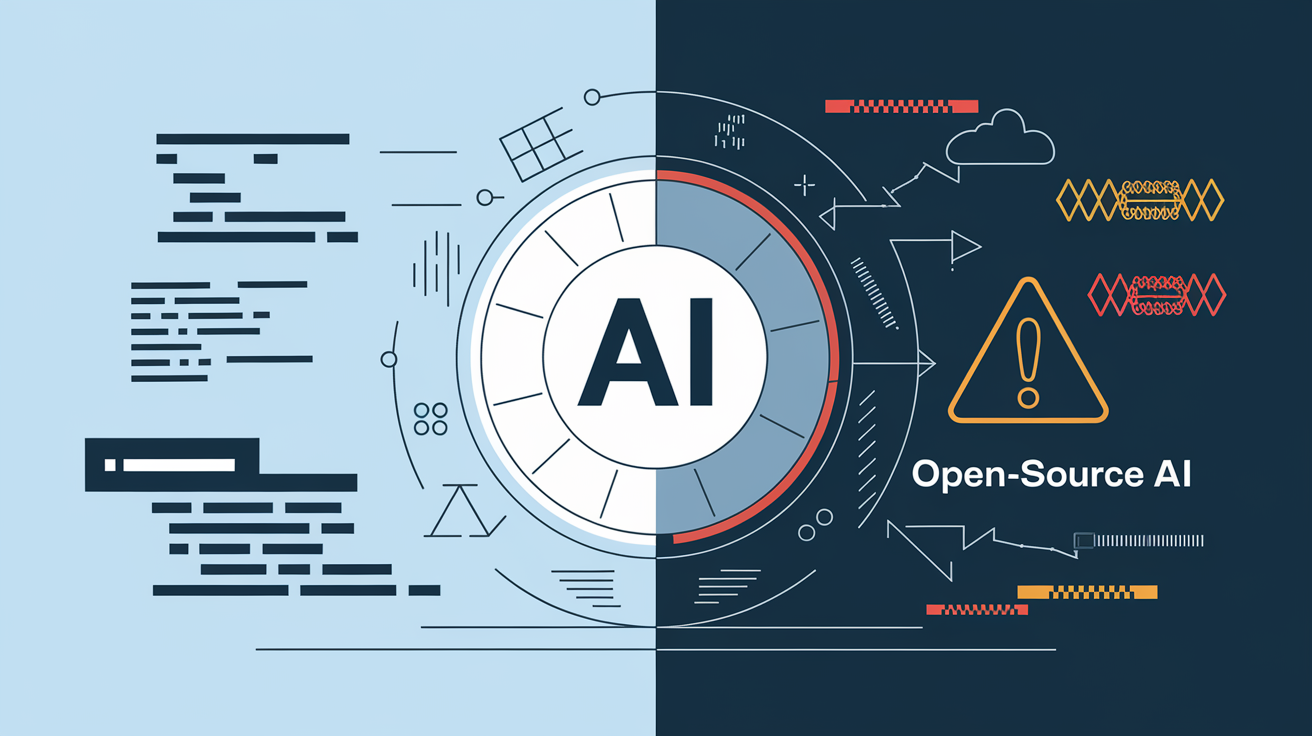Understanding the Potential Risks Associated with Open-Source AI Platforms like DeepSeek
The landscape of artificial intelligence (AI) is rapidly evolving, with open-source platforms like DeepSeek democratizing access to previously exclusive technologies. This democratization fosters unprecedented collaboration and innovation, empowering developers to build transformative AI solutions across diverse sectors. However, the very accessibility of open-source AI like DeepSeek introduces a unique set of risks demanding careful consideration. This article delves into these multifaceted concerns and proposes practical mitigation strategies to ensure responsible development and deployment.
The Rise of Open-Source AI
Open-source AI platforms have fundamentally reshaped the fields of machine learning and data science. Publicly accessible source code promotes transparency, encourages collaboration on an unprecedented scale, and accelerates innovation at a remarkable pace. Developers can scrutinize, modify, and enhance existing codebases, resulting in rapid progress across a wide spectrum of applications, from sophisticated natural language processing models to advanced predictive analytics systems. DeepSeek serves as a prime example, offering robust functionalities and significantly lowering the barrier to entry for both seasoned professionals and aspiring learners. However, the numerous benefits must be carefully weighed against the potential drawbacks.
Potential Risks Associated with Open-Source AI like DeepSeek
1. Security Vulnerabilities
- Exploitation of Vulnerabilities: The open nature of the codebase means that it’s constantly subject to scrutiny. This can lead to the discovery and exploitation of vulnerabilities, potentially resulting in unauthorized access or significant service disruptions. A single vulnerability in open-source AI like DeepSeek could have far-reaching consequences.
- Malicious Modifications: The collaborative nature of open-source projects presents a risk. Untrusted contributors could introduce malicious code into the platform, compromising its integrity and potentially leading to data breaches or other malicious activities. Robust code review processes are paramount to mitigate this threat.
- Dependency Risks: Open-source AI projects often rely on a multitude of third-party libraries. Vulnerabilities in these dependencies can cascade through the entire system, creating significant security risks. Careful vetting of dependencies is essential.
2. Data Privacy and Ethical Concerns
- Data Leakage: Inadequate anonymization of training data used in open-source AI like DeepSeek can lead to serious privacy breaches, exposing sensitive personal information. Robust data anonymization techniques are crucial.
- Ethical Misuse: Open-source AI, including open-source AI like DeepSeek, can be leveraged for malicious purposes. This includes the creation of sophisticated deepfakes, the spread of misinformation, and other harmful applications. Ethical guidelines and responsible use are vital.
- Bias and Discrimination: If training data reflects societal biases, open-source AI models can perpetuate and even amplify those biases, leading to unfair or discriminatory outcomes. Addressing bias in data and algorithms is a critical ethical challenge.
3. Lack of Centralized Accountability
- Fragmentation of Responsibility: The decentralized nature of open-source contributions makes it challenging to establish clear accountability for issues or bugs that arise. A lack of a single point of responsibility can hinder effective problem-solving.
- Inconsistent Quality Control: The variability in the skills and experience levels of contributors can lead to inconsistencies in code quality and model reliability. This can affect the overall robustness and performance of open-source AI like DeepSeek.
- Delayed Updates: Addressing critical vulnerabilities or bugs can be slower in open-source projects due to the lack of a dedicated team focused solely on maintenance and updates.
4. Intellectual Property and Licensing Challenges
- License Compatibility Issues: Integrating code from diverse sources with different open-source licenses can create complex licensing conflicts. Careful consideration of licensing implications is crucial.
- Unclear Ownership: Collaborative development can sometimes lead to disputes over intellectual property rights, particularly in cases of substantial contributions from multiple parties.
- Compliance Risks: Organizations using open-source AI like DeepSeek in their products or services must ensure compliance with all relevant licenses and legal requirements to avoid potential infringement.
5. Reliability and Stability Concerns
- Variable Performance: Frequent updates and contributions, while beneficial for innovation, can sometimes negatively impact the performance and stability of the system. Rigorous testing is essential.
- Insufficient Testing: Inadequate testing of code changes or new features can lead to instability, particularly problematic in mission-critical applications. Comprehensive testing is crucial for reliability.
- Limited Support: Community-driven support, while often enthusiastic, may not be sufficient to meet the needs of large organizations or complex projects. Enterprise-grade support options may be necessary.

6. Regulatory and Compliance Risks
- Non-Compliance with Data Protection Laws: Failure to adhere to regulations like GDPR or CCPA can result in significant legal penalties and reputational damage. Compliance is paramount.
- Lack of Transparency: The complexity of some AI models can create what are known as “black box” systems, making it difficult to understand their decision-making processes, raising concerns in regulated sectors that demand explainability.
- Uncertainty in Governance: The decentralized nature of open-source AI like DeepSeek complicates regulatory oversight and enforcement. Effective governance models are needed.
7. Societal and Economic Impacts
- Job Displacement: Automation powered by AI could lead to job displacement in certain sectors, requiring proactive measures for workforce adaptation and retraining.
- Unequal Access: The benefits of open-source AI may not be evenly distributed, potentially exacerbating existing societal inequalities. Equitable access is crucial.
- Misinformation and Social Manipulation: The accessibility of open-source AI tools can be exploited to create and spread misinformation and propaganda, requiring strategies to combat such misuse.
Mitigation Strategies for Managing Risks
Effectively managing the risks associated with open-source AI like DeepSeek demands proactive and comprehensive measures:
1. Implement Robust Security Practices
- Regular security audits and code reviews are essential to identify and address vulnerabilities proactively.
- Establishing vulnerability disclosure programs encourages responsible reporting of security flaws.
- Secure dependency management helps to minimize risks associated with third-party libraries.
2. Adopt Transparent Data Practices
- Employing advanced data anonymization techniques helps to protect sensitive information.
- Implementing bias mitigation strategies during data preparation and model training is critical for fairness.
- Developing and enforcing clear ethical guidelines for AI development and use are paramount.
3. Establish Clear Governance Structures
- Even within an open-source project, some degree of centralized coordination can improve project management and accountability.
- Defining and enforcing community standards and contribution guidelines ensures consistent quality and minimizes risks.
- Securing legal compliance expertise helps navigate the complex landscape of intellectual property and data protection laws.
4. Enhance Testing and Support Mechanisms
- Implementing automated testing pipelines helps ensure code quality and system stability.
- Cultivating robust community support networks provides valuable assistance to users.
- Offering enterprise-grade support options caters to the specific needs of businesses and organizations.
5. Engage with Regulators and Industry Bodies
- Maintaining proactive dialogue with regulatory bodies ensures compliance and helps shape future policies.
- Participating in transparency initiatives and best-practice development fosters responsible innovation.
- Exploring AI model certification programs can help build trust and confidence in open-source AI systems.
Conclusion
Open-source AI like DeepSeek offers immense potential for progress and innovation. However, responsible development and deployment require a comprehensive understanding of the associated risks and the implementation of effective mitigation strategies. Balancing innovation with ethical considerations and regulatory compliance is critical for realizing the full potential of this transformative technology while minimizing potential harm. Continued collaboration between developers, stakeholders, and regulators is essential for building a safe and sustainable future for open-source AI.
FAQ
- What are the main security risks of using open-source AI?
- Security risks include the exploitation of vulnerabilities, the injection of malicious code, and vulnerabilities within third-party dependencies. Open-source AI like DeepSeek, while beneficial, requires careful attention to security best practices.
- How can data privacy be protected when using open-source AI platforms?
- Data privacy can be significantly enhanced through proper data anonymization techniques, secure data handling practices, and strict adherence to data protection regulations like GDPR and CCPA. Open-source AI like DeepSeek necessitates a proactive approach to data privacy.
- What are the ethical concerns surrounding open-source AI?
- Ethical concerns include the potential for misuse in creating deepfakes or biased algorithms, necessitating the development and strict enforcement of comprehensive ethical guidelines for open-source AI like DeepSeek.
- How can the lack of centralized accountability in open-source projects be addressed?
- Establishing clear governance structures, widely accepted community standards, and a core team overseeing the project can dramatically improve accountability for open-source AI like DeepSeek.
- What steps can be taken to ensure the reliability and stability of open-source AI models?
- Implementing continuous integration and automated testing pipelines, along with robust community support and potentially enterprise-grade support options, significantly enhance the reliability and stability of open-source AI like DeepSeek.
- What are the regulatory compliance challenges for organizations using open-source AI?
- Organizations must ensure strict compliance with data protection laws (GDPR, CCPA, etc.), intellectual property rights, and other relevant regulations when utilizing open-source AI like DeepSeek.
- What is the role of collaboration in mitigating the risks of open-source AI?
- Collaboration between developers, industry stakeholders, and regulatory bodies is absolutely vital for establishing best practices, addressing vulnerabilities, and shaping the responsible development and usage of open-source AI like DeepSeek.

